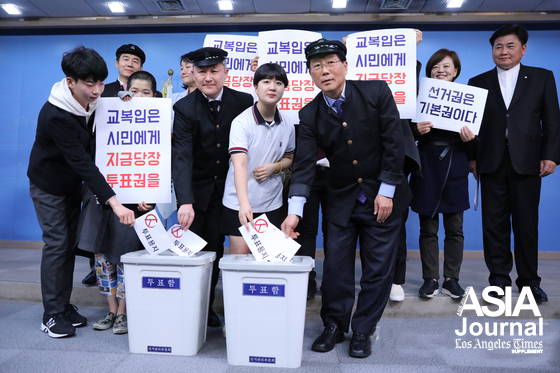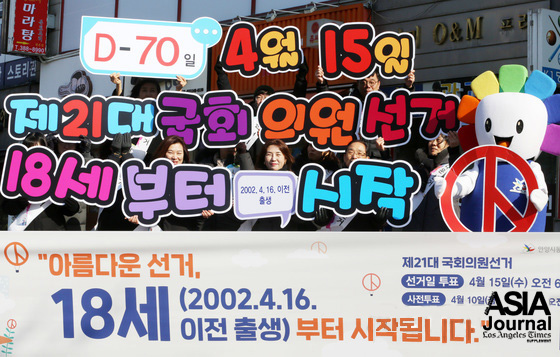
An additional 0.5 million of 18-years-old new voters has come to cast their votes on the April General Election.
Few months later, on February 6th, the National Election Commission banned mock elections that will hold in March and April. The Seoul Metropolitan Office of Education was to select 40 out of 17 education offices nationwide, including 10 elementary schools, 11 middle schools and 19 high schools, and hold mock elections in March and April. It was to give teenagers chances to learn about the electoral system and rights, the basic system of democracy, through mock elections.
The National Election Commission stopped mock elections not only for high school students who are going to perform their votes for upcoming election but also for students who are in elementary school and middle school. The main reason was if the faculty leads the education of the students who are eligible to vote, it could violate Article 86 para 1 of the current Public Official Election Act, Article 3 of the Public Official Election Act, which prohibits the examination or announcement of the voter’s approval of political parties or candidates. They added “even for students who do not have the right to vote, the teacher’s mock vote under the education office’s plan is an act to influence the election according to the pattern of conduct.” Even though mock election’s result will come out on 16th April next day of real election, it is doubted if the mock election can influence the real one.

Among 35 OECD countries, South Korea was the only country that put a ‘over the 19 full-years old’ limit onto enfranchisement. With establishing the government of the Republic of Korea back in 1948, the electoral age for national elections had started from the 21 full-years old. It was not until 2005 that the minimum age for electorates descended to 19 years old. When the June Local election in 2018 was approaching, it was highly controversial matter whether to pass the modified election bill, which at last failed to activate. Last December, lowering the voting age, as a part of the fast-track agenda, has finally passed the full house of the National Assembly with the thrust by ‘4+1’ party alliance – including the ruling Democratic Party, Justice Party, Democratic Peace Party, Righteous Future Party, and Alternative New Party, except one unwieldy outlier, Liberty Korea Party.
Even right after the passage of the bill, arguments about voting age are still out there. Age 18 teenagers in Korea are seniors in high school who are mostly busy preparing for their future. Most of them are also taking suneung, the most important stepping-stone test for college enrollment like SAT. It could be their big period for themselves. However, politicization of class is one of the most worrying parts of lowering the votable age. In many classes, it is common that students don’t have lots of opportunities to learn and talk about on-going political issues within our society. Especially election experience, democratic civic education has been not importantly considered in education compared to others. With these backgrounds, some worried that teachers with distinct political preference might impact on student’s political decisions.
To prevent those, we need to aware that the concept of suffrage should be provided to future generations in right way. The line of political bias need to be cleared. Its range need to be more specific to become the norm for the community. In UK, anyone over the age of 18 started to vote since 1969. Later, UK has been designated the Citizenship Education as a required subject for 11 to 16 years old students to exercise citizenship rights.There is also consistent attempt in the UK to reduce the voting age from 18 to 16. Also, Finland operates children’s congresses, youth committees and national-level youth council programs to encourage active political participation for students.
It is also urgent to discuss supplementary legislation following the NEC’s suspension. Currently, the government, education authorities have yet to come up with related regulations. Without overhauling related laws, the controversy over election law violations will grow further. Japan has reorganized 348 statutes in line with the lowering of its election age. The education office should examine whether simulated election education is against the law and make additional rules to ensure that election activities in schools are legitimate.

Some people still questioned about the qualification of teenagers. They thought that teenagers are not ready to make their own decisions and will eventually become political scapegoats. Their worries came up with the word ‘immaturity’. Because of those worries, their voices were not listened and reflected so far. It is fact that only adults vote and decide things even if a policy affects huge parts of teenagers’ lives. However, you should aware that teenagers was always in Korean history and raised up their voices for the better future. From Japanese colonial period of 3.1 to the candlelight vigil for the regime step down, teenagers have participated in politics as the owner of a country and stood up for their rights.
Democracy starts from listening and respecting everyone’s opinion. It should been questioned if we are in real Democracy without reflecting teenagers’ voices. Getting votes is not a chose, but a matter of course. This lowering of the election age is the first huge step and leads to adds half a million high school voters. It doesn’t mean just increasing votes in number. It is the change to acknowledge teenagers as the real citizen by giving their votes. What’s important now is the policies that we should focus on for the right vote action and move forward. With many people’s efforts, teenagers will feel that their voices are respected and grow up as real citizen you expect.
Nahyun Lee
Mac Kim
Yujin Oh
Asia Journal
(Los Angeles Times Advertising Supplement)
K-UNIV Reporter



